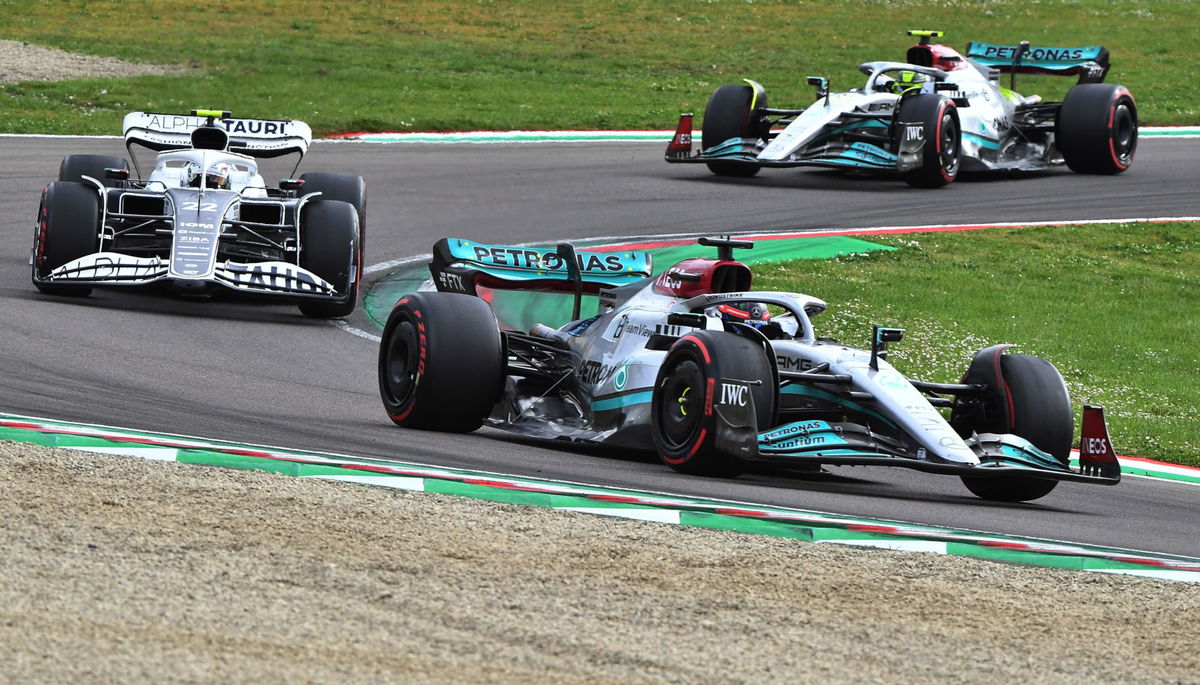
Reuters
Formula One F1 – Emilia Romagna Grand Prix – Autodromo Enzo e Dino Ferrari, Imola, Italy – April 23, 2022 Mercedes’ George Russell, AlphaTauri’s Yuki Tsunoda and Mercedes’ Lewis Hamilton in action during the sprint race REUTERS/Jennifer Lorenzini

Reuters
Formula One F1 – Emilia Romagna Grand Prix – Autodromo Enzo e Dino Ferrari, Imola, Italy – April 23, 2022 Mercedes’ George Russell, AlphaTauri’s Yuki Tsunoda and Mercedes’ Lewis Hamilton in action during the sprint race REUTERS/Jennifer Lorenzini

Reuters
Formula One F1 – Emilia Romagna Grand Prix – Autodromo Enzo e Dino Ferrari, Imola, Italy – April 23, 2022 Mercedes’ George Russell, AlphaTauri’s Yuki Tsunoda and Mercedes’ Lewis Hamilton in action during the sprint race REUTERS/Jennifer Lorenzini

Reuters
Formula One F1 – Emilia Romagna Grand Prix – Autodromo Enzo e Dino Ferrari, Imola, Italy – April 23, 2022 Mercedes’ George Russell, AlphaTauri’s Yuki Tsunoda and Mercedes’ Lewis Hamilton in action during the sprint race REUTERS/Jennifer Lorenzini
DRS is a term that we F1 fans come across a lot, especially this season. Be it the Charles Leclerc vs Max Verstappen battle in Saudi Arabia, where the drivers were engaged in a bizarre strategy to let each other ahead at the DRS detection zone, or the differing opinions among drivers on why the DRS was implemented so late in Imola. It has provided plenty of talking points, without a doubt.
Watch What’s Trending Now!
For the newer fans, F1 introduced the Drag Reduction System in 2011. When the driver is within a second or so of another car, a driver can use DRS, which opens up the rear wing. This reduces downforce, which increases straight-line speed, thus aiding overtaking.
Read More: Max Verstappen Credits Strategical DRS Battle for the F1 Victory at Jeddah
Now, with changes in regulations bringing the grid closer, FIA’s head of aerodynamics Jason Somerville admitted Formula 1 could remove DRS in the future.
DRS might not feature from the 2026 F1 season
Over the past decade, we have seen plenty of stunning overtakes, thanks to the DRS. However, some believe that the overtaking aspect is predictable because of this feature. Moreover, the change in regulations that aimed to bring the grid closer also made DRS much more powerful, allowing drivers to easily overtake each other.
Jason Somerville revealed that during the development of the cars ahead of this season, it became clear that DRS will still play an important role. The new regulations have made the cars compete closer and Somerville believes DRS can be modified according to the venues.

Reuters
Formula One F1 – Bahrain Grand Prix – Bahrain International Circuit, Sakhir, Bahrain – March 20, 2022 Mercedes’ Lewis Hamilton and Haas’ Kevin Magnussen in action during the race REUTERS/Hamad I Mohammed
“I think DRS, for us, is a very tune-able feature. It’s very circuit-dependent and it can be dialed in and out,” said Sommerville, who also admitted that they could expunge it.
“I think most of us feel, longer-term, we’d very much like to try and phase DRS out if we can. But we didn’t think that was necessarily going to be the right thing to do overnight for these regulations,” he further added.
WATCH THIS STORY: Lewis Hamilton’s Biggest F1 Crashes
Formula 1 will also change the sport’s technical regulations in 2026. And Sommerville revealed that for the 2026 cars, DRS will have a much lesser role to play. He stated, “For the 2026 car, we’re looking at different solutions. And it may be that DRS doesn’t have to have such an important role in the concept of those cars.”
Although DRS has its flaws, it has given us some enticing battles over the years. Should F1 move away from DRS? Leave your opinion in the comments.

